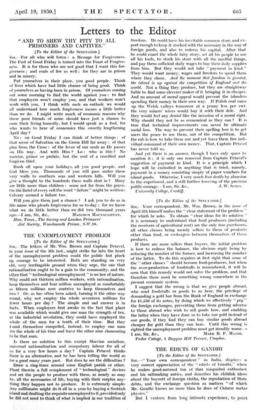THE UNEMPLOYMENT PROBLEM
[To the Editor of the SPECTATOR.]
Sin,—The letters of Mr. Wm. Brown and Captain Petavel, in your issue of the 5th inst., might strike far into the heart of the unemployment problem could the public but pluck up courage to be interested. Both are standing on very old, very irrefragable ground when they urge, the one that rationalization ought to be a gain to the community, and the other that "technological unemployment" is no law of nature. Why could not thirteen million workers, with rationalization, keep themselves and four million unemployed as comfortably as fifteen millions now contrive to keep themselves and two ? Or, as has often been asked, turning it the other way round,. why not employ the whole seventeen millions for fewer hours per day.? The simple and sad answer is in facts. When employers first awoke to the fact that plant was available which would give one man the strength of ten, at the industrial revolution, they could have employed the whole of the men for a tenth of their time. But they found themselves compelled, instead, to employ one man for the whole of his time and leave the other nine clamouring to be that man.
Is there no solution to this except Shavian socialism, universal nationalization and compulsory labour for all of us for a very few hours a day ? Captain Petavel thinks there is an alternative, and he has been telling the world so for a good many years past. -But does he see the difficulties ?
Draw a ring-fence around some English parish or other. Plant therein a full complement of " technological " devices and set the people to produce with them, as nearly as may be, all the necessaries of life, buying with their surplus any- thing they happen not to produce. It is extremely simple. Any millionaire might do it all in a year by buying a Scottish island and drafting the requisite unemployed to it, provided only he did not need to think of what is implied in our tradition of
freedom. He could have his inevitable common store, and ex- port enough to keep it stocked with the necessary in the way of foreign goods, and also to redeem his capital. After that he could enact the whole fairy story, set all his people to use all his tools, to stock his store with all the heedful things, and pay them sufficient daily wages to buy their daily supplies from him. But they would not take "payment in kind." They would want money, wages and freedom to spend them where they chose. And the moment that freedom is granted, the island is up against the competition of England and the world. Not a thing they produce, but they are straightway liable to find some cleverer maker of it bringing it in cheaper. And no amount of moral appeal would prevent the islanders spending their money in their own way. If Polish coal came up the Welsh valleys tomorrow at a penny less per cwt. the very miners' wives would buy it with their dole. And they would feel any denial like the invasion of a moral right. Why should they not be as economical as they can ? It is true that technical improvements can never be ultimate social loss. The way to prevent their spelling loss is to get users the peace to use them, out of the competition. But the rub is how to take them out and yet leave them free indi- vidual command of their own money. That, Captain Petavel has never told us.
And yet there is an answer, though I have only space to mention it ; it is only one removed from Captain Petavel's suggestion of payment in kind. It is a principle which I hope will be embodied in anything that is tried, namely, payment in a money consisting simply of paper vouchers for island goods. Otherwise, I very much fear death by abrasion to the experiment, and a still further lowering of the precious public courage.—I am, Sir, Ste., J. W. Scorn University College, C'ardiff.










































 Previous page
Previous page